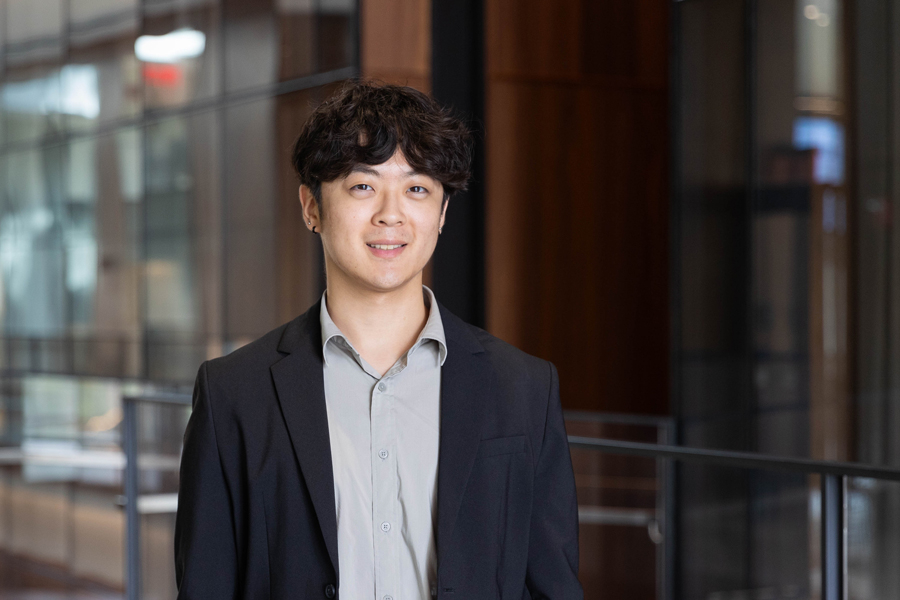The Value of SAIS Goes Beyond the Classroom

Name: Jaehyoung Ju
Home Country: Korea
Degree: Master of Arts in International Relations (MAIR)
Scholarship: Public Service Fellow, Korea Studies Fellowship
Before joining the Johns Hopkins School of Advanced International Studies (SAIS), what were you doing?
After graduating from New York University with a degree in sociology and East Asian studies, I began preparing for law school by working at an immigration law firm in New York City. I later discovered a love for foreign policy research while at the Korea Society, which then led me to the Asia Society Policy Institute and Human Rights Watch. Here, I performed research tasks and learned more about the behind-the-scenes operations of nonprofits and NGOs.I knew SAIS’ extremely diverse student body would raise the caliber of my entire graduate school experience.
What led you to Johns Hopkins SAIS?
I first learned about SAIS during an admissions fair. What stood out to me was the research-oriented program, which emphasized both qualitative and quantitative analytical skills. I also learned about the school’s courses to help develop those skills in students who did not come from a quant-intensive background.Just as important to me as the academics was the diversity of its students. I knew SAIS’ extremely diverse student body would raise the caliber of my entire graduate school experience. And the students at SAIS are not just diverse in terms of their nationalities, but also their professional backgrounds and interests. I learn almost as much from my peers as I do from the faculty.

Jaehyoung participated in the 2024 Trilateral Technology Leadership Training Program hosted at SAIS.
What has been your favorite experience at SAIS?
I came to SAIS with the explicit goal of facilitating close relations between Korea, Japan, and the U.S., so it was an honor to serve as a junior fellow for the Trilateral Technology Leadership Training Program, which was announced at the 2023 Camp David Summit and hosted by SAIS.Not only did the program hone my knowledge on emerging technologies and coordinated governance, but it gave me the opportunity to help strengthen the partnership between the U.S. and Japan. Being a part of the Trilateral Technology Leadership Training Program was a formative experience in my personal and professional life, and one I will always be grateful for.
What is one piece of advice you would give to students in the process of choosing graduate schools?
Diversify the range of sources you use to make a decision and look beyond your supervisors and admissions counselors. Speak with current students, as well as recent alumni and mid-career alumni. The former may have a fresher take on their experiences, while the latter can share their thoughts on the degree and network’s impact on their careers.
The SAIS Korea Club served homemade kimbap, japchae, and pajeon during SAIS’ annual International Dinner.
What is your favorite SAIS tradition?
My favorite tradition is the SAIS International Dinner! Every year, student clubs like SAIS Africa, the Mexican Student Association, Japan Club, and others set up booths featuring their cultural cuisine. As vice president of SAIS Korea Club, the E-board and I decided to go fully homemade and spent a day making rolls of kimbap (a Korean seaweed rice roll) japchae (stir-fried glass noodles), and pajeon (Korean scallion pancakes).Not all IR is based on high politics; sometimes, sharing foods from one another’s culture strengthens bonds more effectively than a meeting or negotiation.
What was one of the things you learned during your time at SAIS that transformed your perspective?
Whether it be email overload or application deadlines, I’m learning to take a step back and reevaluate situations. Being in grad school can be a lot of information at one time. In these times, it’s absolutely critical to take a step back, look at the individual problems we’re facing, assess them in the broader scheme of things, and determine whether or not, for example, applying to that fellowship is truly an “end of history.” I probably shouldn’t misrepresent Fukuyama’s theory like that.What do you plan on pursuing after graduation?
I would like to pursue a career in government affairs analyzing innovation policy and international security competition during my remaining time in the U.S. I will apply my experiences back in Korea to benefit the nation and community at large by working with the government in enhancing national competitiveness.If you are looking to learn more about what it's like to be a current student at Johns Hopkins SAIS, we encourage you to schedule a virtual appointment with one of our Admissions Fellows.
Enjoyed reading Jaehyoung's experience? Learn more about our Master of Arts in International Relations.
Back to Student Stories